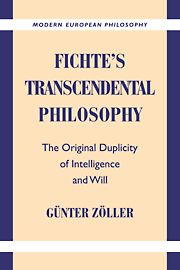Book contents
- Frontmatter
- Contents
- Acknowledgments
- Method of Citation for Fichte's and Kant's Works
- Key to Fichte's Works Cited
- Introduction
- Part I Thinking about Thinking
- Part II Knowing and Doing
- Part III Thinking and Willing
- 5 Willing as Thinking
- 6 Ideal Thinking and Real Thinking
- Part IV Pure Willing
- Notes
- Bibliography
- Index
6 - Ideal Thinking and Real Thinking
Published online by Cambridge University Press: 05 June 2012
- Frontmatter
- Contents
- Acknowledgments
- Method of Citation for Fichte's and Kant's Works
- Key to Fichte's Works Cited
- Introduction
- Part I Thinking about Thinking
- Part II Knowing and Doing
- Part III Thinking and Willing
- 5 Willing as Thinking
- 6 Ideal Thinking and Real Thinking
- Part IV Pure Willing
- Notes
- Bibliography
- Index
Summary
Fichte's work on the Wissenschaftslehre from his Jena period centers around the role of the subject as the principle of consciousness and its objects. Taken as a doctrinal concept, the Wissenschaftslehre amounts to a systematically radicalized Kantian transcendental idealism according to which all objects of possible experience, and indeed all objects in general, are necessarily conditioned by some nonempirical activity of the subject. Notoriously, Fichte eliminates the transcendental-realist remnants of Kant's formal idealism, viz., the things in themselves, in favor of a complete transcendental idealism, which has the matter as well as the form of all objectivity originate entirely in the subject and its transcendental acts.
With its ambition toward a systematic theory of consciousness, the Wissenschaftslehre takes on the difficult task of accounting for the unity among consciousness and its objects, while preserving the diversity and divisions that make up the complex structures of mind and world. Given the foundational role of the subject in the Wissenschaftslehre, the delicate balance between unity and difference concerns most importantly the nature of the subject itself. Fichte refers to that unity-within-duality and duality-withinunity by the nominalized pronoun of the first-person singular, “I” (Ich), and coins for it such paradoxical terms as “subject-object” and “subject-objectivity.”
The most advanced expression of Fichte's reflections on the complex unity of the subject is to be found in the writings of the new presentation of the Jena Wissenschaftslehre (1796–1799), chief among them the lectures on the Wissenschaftslehre nova methodo.
- Type
- Chapter
- Information
- Fichte's Transcendental PhilosophyThe Original Duplicity of Intelligence and Will, pp. 83 - 94Publisher: Cambridge University PressPrint publication year: 1998



